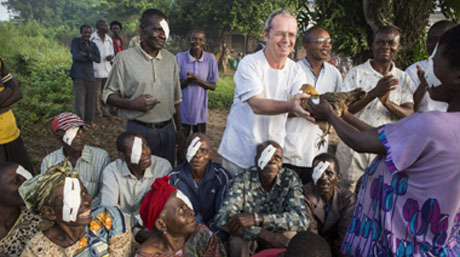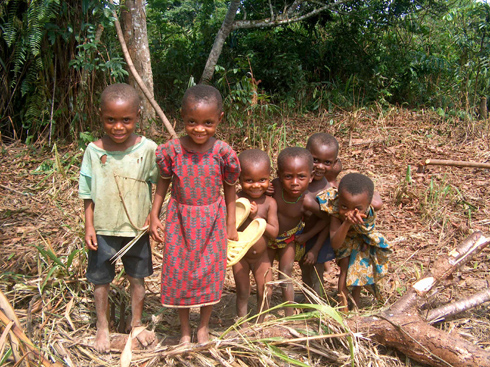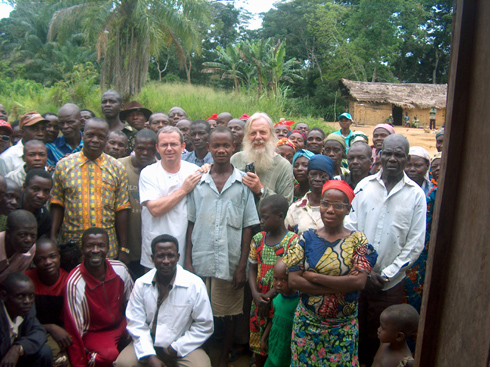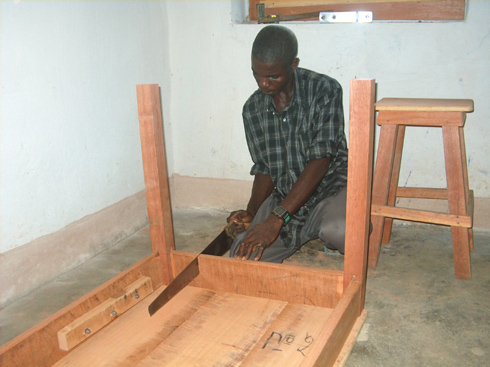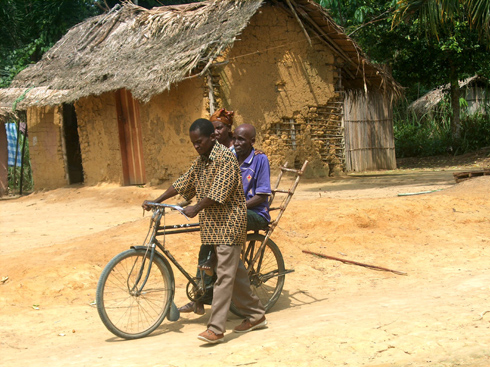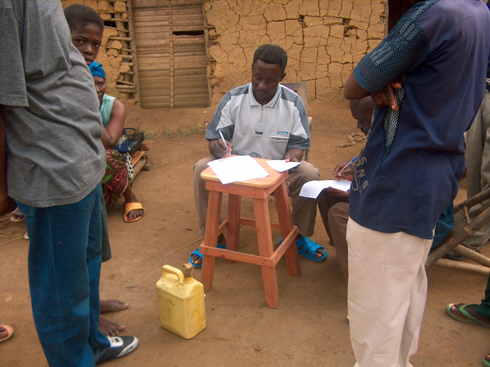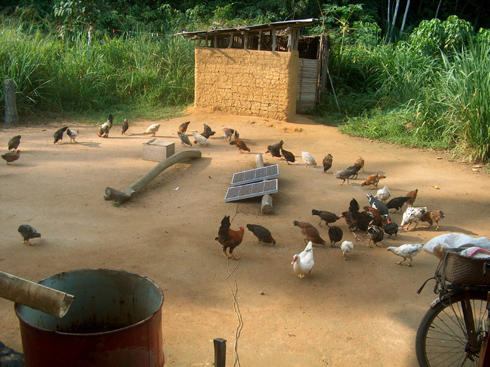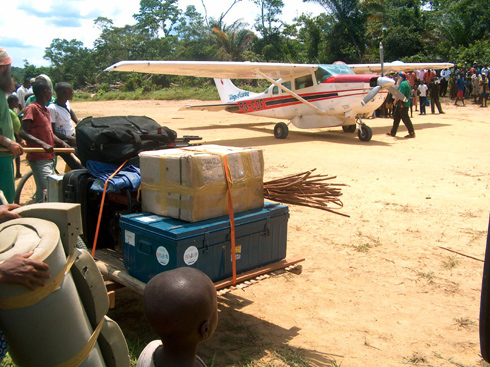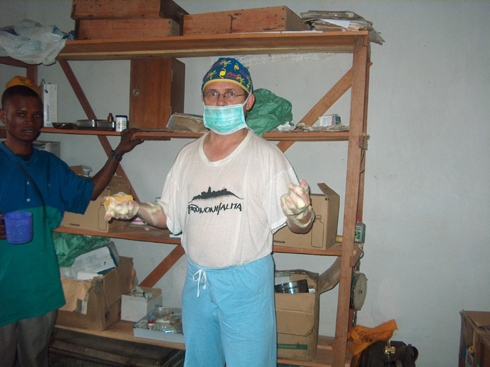Complying with the invitation of the Agnus Dei Community, I went on a two-week ophthalmic mission to the Pygmies with the male nurse, Simon Pierre Kasongo on October 20, 2008.
We named the mission after St. Elizabeth of Hungary.
The area in question is Lokoko, a small Pygmy settlement in Lomela county, some 150 km from the town of Kole. Lokoko is situated in the heart of the equatorial forest. The closest ophthalmic centre is in the town of Lodja at a distance of 200 km as the crow flies. In spite of being 400 km away, this region is administered from Mbuji Mayi.
Preparations for the mission
We have been here already in 2007 for a fortnight's mission, which proved very successful. Both the local inhabitants and the authorities were very satisfied with our work at the time, and asked us to continue our efforts to look after the people's eye problems in the future as well.
The Agnus Dei Community, established in the area for the past three years, initiated the mission motivated by the locals' afflictions and their lack of care. The Community undertook the team's travelling (small aeroplane), accommodation and living expenses. They ensured all technical assistance and the safe and smooth execution of the proceedings, such as the sterilization of sheets and instruments, as well as acquiring part of the medications and spectacles. On our part, the St. Raphael Ophthalmological Centre took on to provide all other instruments and supplies required for examinations and surgery.
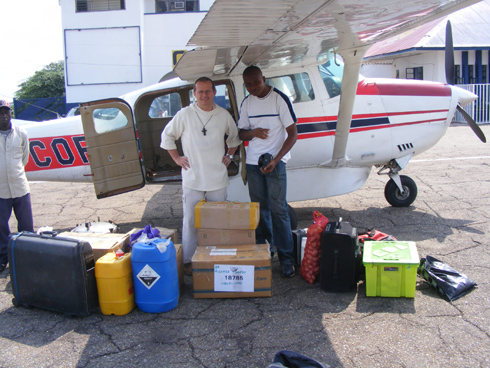
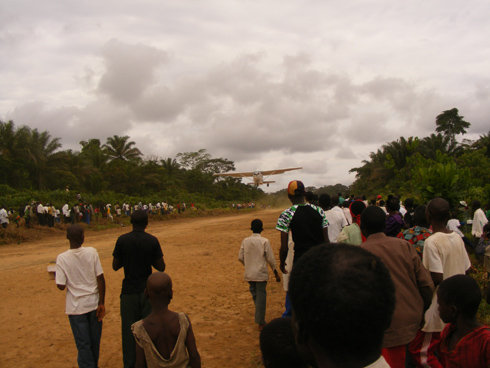
The trip and the welcome
We left from the airport of Mbuji Mayi on October 20, 2008 by small aeroplane. I was accompanied by Simon Pierre, the assistant head of the Mbuji Mayi ophthalmological centre. We took the following equipment with us:
Portable slit-lamp, ophthalmoscope, trial lens cabinet, eye chart, Shiotz tonometer, operation microscope, microsurgical equipment, dilator, anaesthetics, syringes and disposable needles, bandages, sterile sheets, pressure cooker, electrical generator and the necessary petrol.
Our working conditions
We set up the dispensary in the building of the Pygmies' medical centre, consisting of four 3x3m rooms. We were accommodated in lodgings some 300 metres from the centre.
Work performed
In the course of three weeks we examined 974 patients and performed 91 surgical interventions.
Already on the first day we had to face the huge mass of patients, many of whom had come on foot from more than 100 km afar; there were quite a few who had been there for weeks awaiting our arrival. The influx was due to the success of our previous year's mission. Good news travels fast, and as a result patients flocked to us from far and wide. The other attraction was the extremely low fees. We charged them the equivalent of 80 euro cents for a consultation, while the price of a surgical intervention was a chicken (= 4 euros). We also supplied the patients with the necessary medicaments. Approximately 40% of the patients needed glasses, and some 300 pairs of spectacles, mainly reading glasses were distributed.
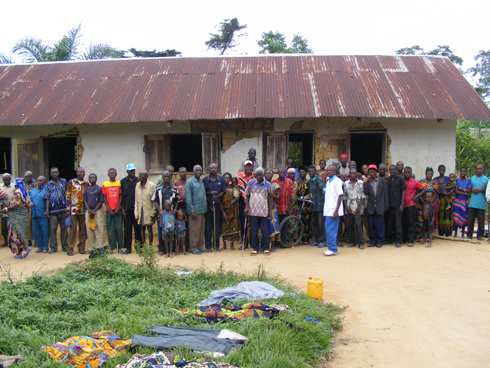
Since many of the patients had come from several hundred kilometres away, they were lodged in the neighbouring villages and in the local school.
I limited the number of operations to 15 a day, as this was the maximum that I was able to perform; even so I became very tired by the end of the week. I operated on 35 patients who had bilateral cataracts. However, because of the shortage of time we could only operate on one eye. I stopped operating during the last week, as we had to leave time for postoperative treatments.
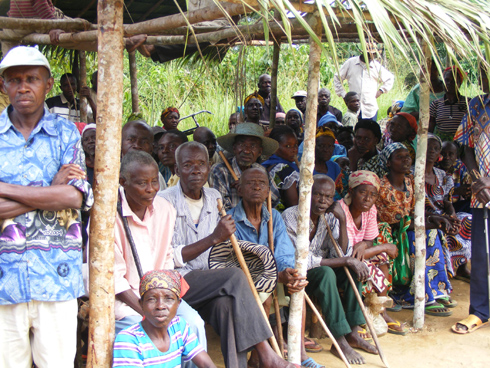
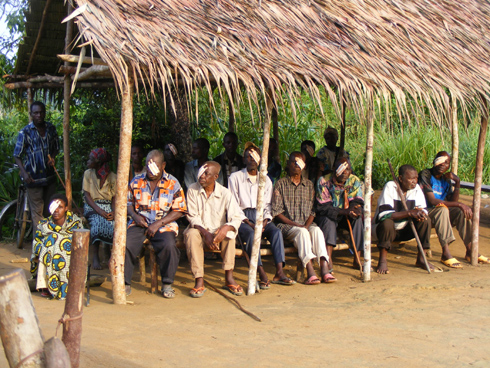
In the course of the 68 cataract operations, we implanted the Hungarian MEDICONTUR firm's intraocular lenses. Only in two cases was there any fibrin reaction, the postoperative period for the rest of the patients was problem-free. There was not a single case of infection. This is due in great measure to Sister Raphaëla's devoted and meticulous work. As far as sterilization was concerned, I opted for using a sizeable pressure cooker that was large enough for all our instruments. At the time of my previous mission we took an autoclave, but as it required a large generator and a lot of fuel, it took two trips for the plane to carry the large amount of paraphernalia, which made the whole enterprise unduly expensive. The method of sterilization in the pressure cooker turned out to be very successful, and the instruments reacted well to it. Thus we could make do with one generator that we needed for the operating microscope.
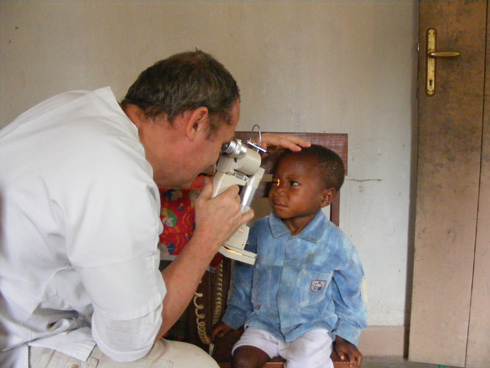
Problems encountered
• From the first day we had problems with the admission procedure; the people were aggressive and demanding (it is said that this is endemic in the region). Seeing the crowd, we limited the number of consultations to 130 per day. We worked without stopping from morning to night. Even so, we could only devote an average of four minutes to each patient. Under these circumstances the examinations could only be said to have been superficial. Still, the ratio of serious cases (cataracts, glaucoma, hypermetropy), was significant, which actually speeded up proceedings, since these patients were operated on on different days when there was no consultation.
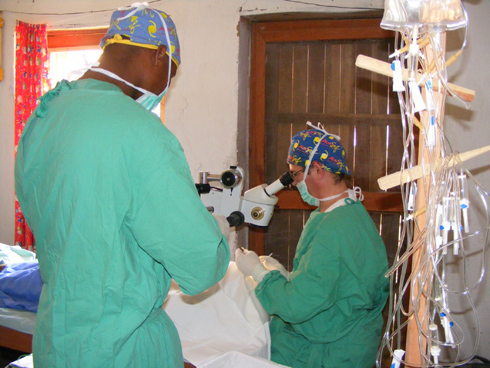
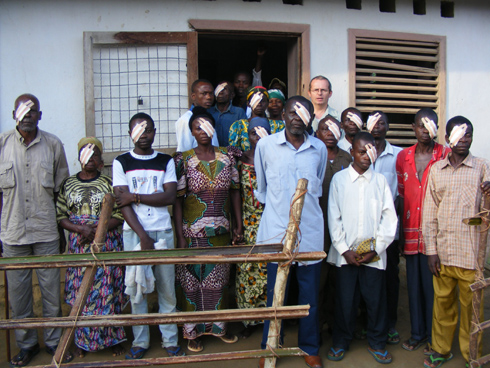
• Some of the patients came from very far away and arrived in a state of poor general health. For example, an old man, brought to us by his family, was so weak that on his arrival we immediately sent him the hospital at Tshudi, 3 km distant from Lokoko. He died there two days later of general debilitation.
• The huge number of patients necessitated superhuman efforts on our part; we needed all our strength.
• There were five cases where we could not undertake surgery, as they would have required general anaesthesia, and we had neither the human nor the technical resources this would have necessitated.
• By the end of our mission, all our supplies were exhausted: medicines, implant lenses, spectacles. We had to face grave problems regarding how to look after our glaucoma patients. Should we ensure their medical treatment for a whole year, or should we operated on them without any distinction? In those cases where glaucoma is in an advanced stage, surgery can sometimes cause serious complications.
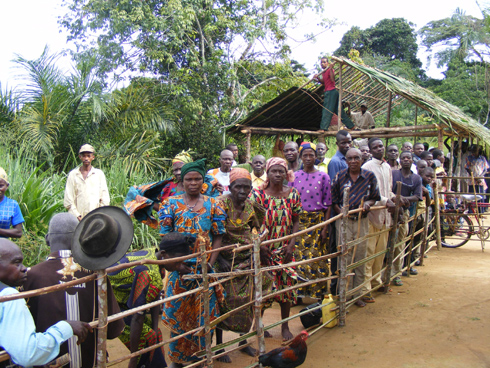
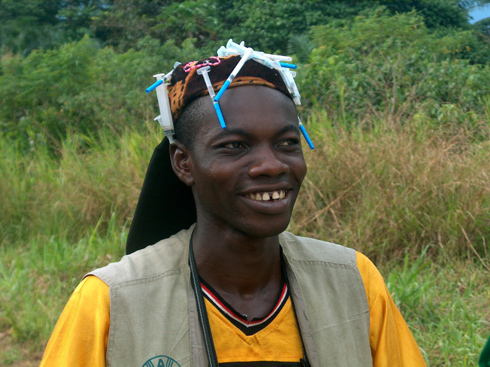
• In spite of the friendly reception and the excellent organization by the Community, such a mission demands tremendous endurance in view of nocturnal attacks by ants, insect bites, unusual food, 80% humidity, daily downpours, etc.
On the other hand, there are all those patients needing our help, some of them blind from cataracts for years, who suddenly regain their sight after the operation, the Pygmies, the fauna, the tropical forest… they make up for everything.
Recommendations
Seeing the patients' satisfaction, my suggestions for the next mission are as follows:
1. At least two doctors and two assistants will be necessary.
2. To conduct our activities in two different locations in order to be able to carry out consultations and operations simultaneously.
3. To seek more means for acquiring medications. To find as many as possible European sources for free eye drops.
4. Raising the price of spectacles. At least 70% of patients availed themselves of the low prices and bought glasses. We ought to establish an optimal price that would leave us with sufficient money to pay the nursing staff a decent allowance.
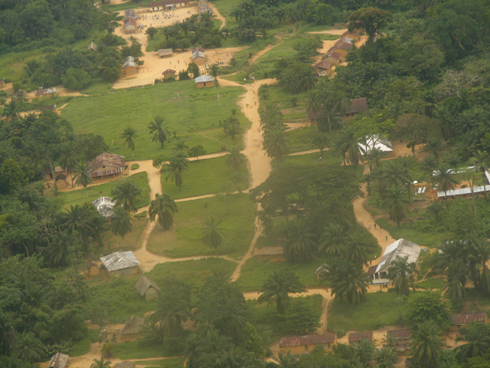
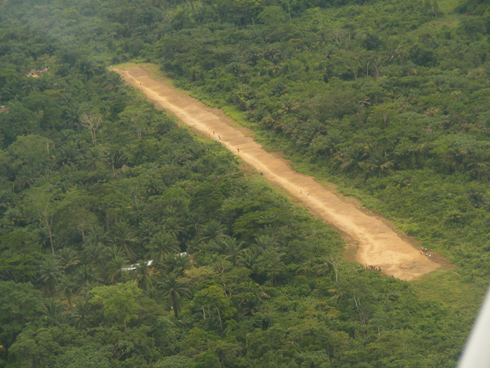
The return trip
At the landing field we watched the sky anxiously, whether the plane would arrive to pick us up. We had almost given up hope when it landed two hours overdue. We took off in pouring rain and had to manoeuvre to avoid the storm areas, but eventually arrived safely in Mbuji Mayi.
Excerpt from Brother Richard's letter about the mission:
"I have just arrived from an ophthalmology mission, which we conducted in the small village of Lokoko in the heart of the equatorial rainforest. This was our second mission there. We were inundated by patients. They came from far and wide; there were some who had walked for 600 km across the forest! During our three weeks' stay we cared for 974 patients, and I performed 91 operations. Ninety percent of the surgical interventions were for cataracts. Of these, 27 patients had bilateral cataracts. These patients of mine went home praising the Lord for being able to see again! I had a patient, who had been blind for ten years! When he regained his sight, he said he was going home to see what his wives (he had three of them) looked like. 50% of the patients came with spectacle problems; we provided them there and then with glasses that we had brought along with us. This is a great help for them because, although presbyopia is a common vision problem, it can be very frustrating since the patient cannot read... and they love reading! By the end of our mission, all our supplies were exhausted: gloves, sutures, implant lenses, spectacles medicines... What remained was the promise: We shall come again next year, and then we'll operate on you too. The low consultation fee – 80 euro cents – was a great success, while the charge for an operation was a chicken. You can imagine, we had a whole poultry-yard. We ate most of the chickens, while patients who had come from far away consumed the rest. We didn't charge the patients for the medicines. Unfortunately our stocks were not sufficient, especially of those required for glaucoma patients. This is a very tricky disease, because it needs regular checkups. We encountered several patients suffering from river blindness, there was even a patient who had a larva in his eye (Ophtalmomyasis interna)! I hope that by next year even more people will have received news of our services and that we shall be able to help even more patients. We shall have to embark on our next mission with a larger staff and more equipment.
And in conclusion an endearing comment: 'Doctor, my eyes become red from the rays of the video. Would you recommend scented glasses? (He meant sunglasses.)
So you see, we don't get bored during our missions!"



